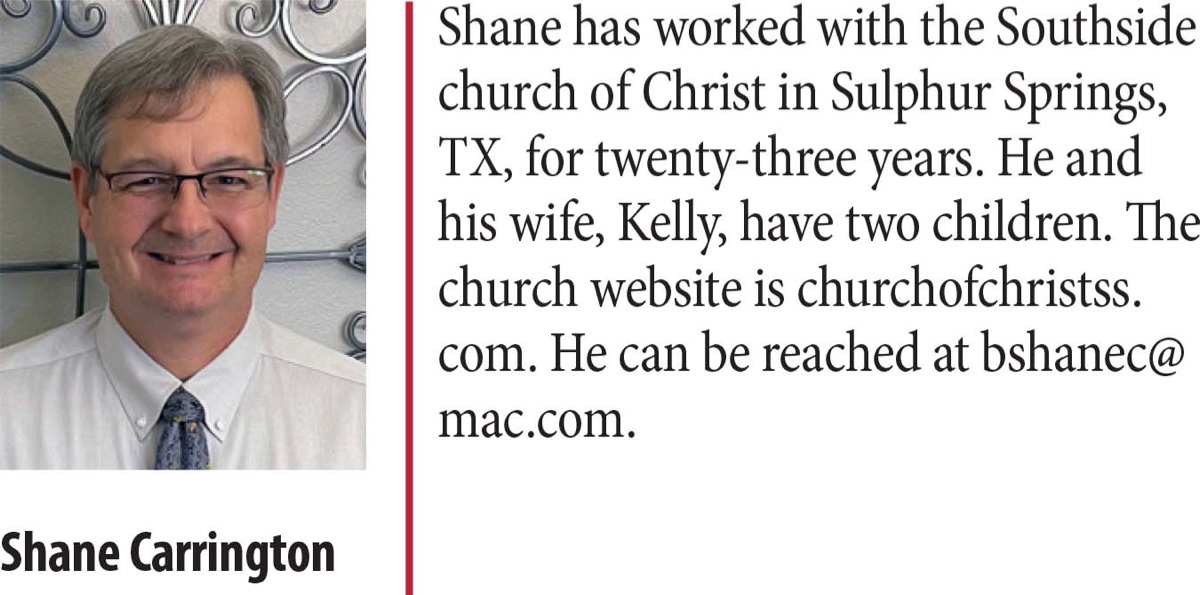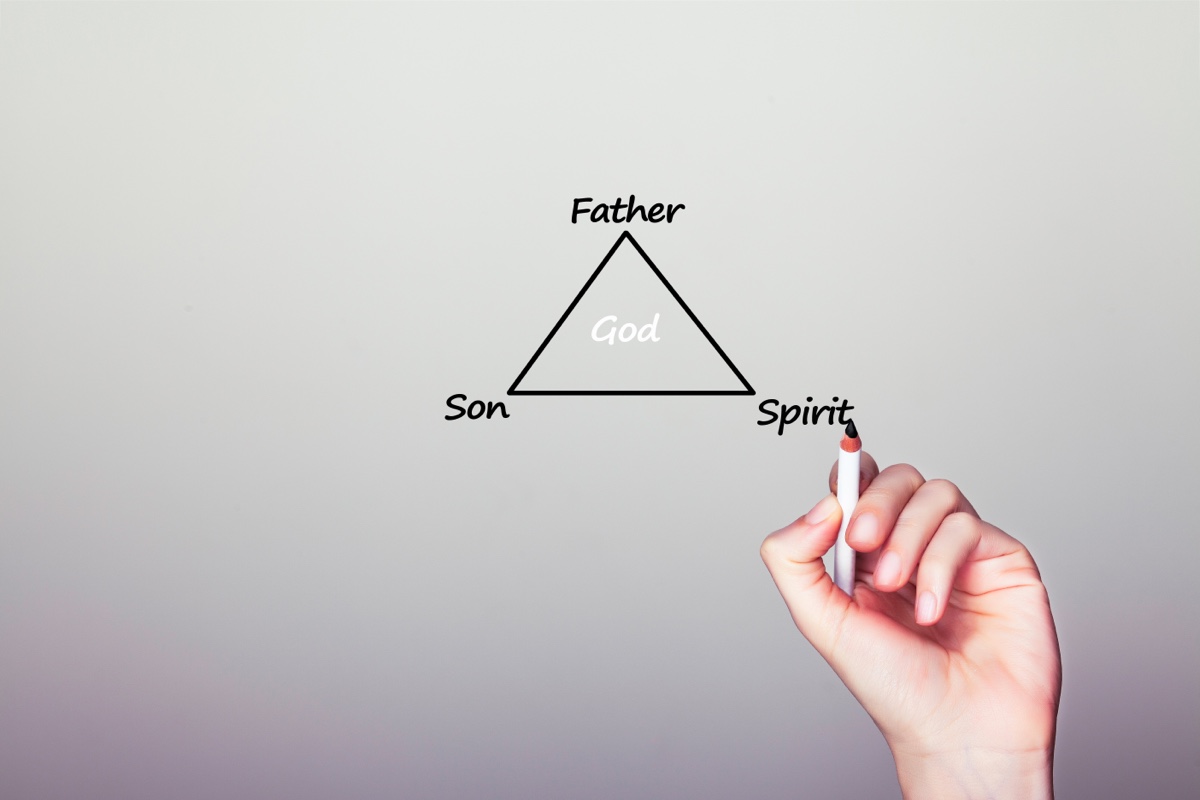by Shane Carrington
Synopsis: Like the Father and the Son, the Holy Spirit is a distinct, divine personality worthy of adoration and service.
We hear a great deal about the Father and the Son. Each possesses unique roles and responsibilities. Both are worthy of our adoration, worship, and trusting submission.
If the Holy Spirit is also a divine person (Acts 5:3-4), a reality to which Scripture abundantly attests, He deserves the same. Let’s explore the divine nature of the Holy Spirit and some associated implications.
The term “Godhead” (Rom. 1:20, KJV) means “divine nature” (Thayer, 285). While the Bible clearly teaches that there is “one God” (Deut. 6:4-6; Mark 12:28-31), it also reveals that there are three distinct persons who are fully divine (Matt. 3:16; 28:19). The terms “Godhead” and “God” mean divine nature in contrast to multiple, competing false gods (cf. Deut. 32:39; Isa. 44:6-20; 45:5-6).
The first chapter of Genesis offers our first hint at multiple divine persons:
Then God said, “Let Us make man in Our image, according to Our likeness; and let them rule. . . .” God created man in His own image, in the image of God He created him; male and female He created them (Gen. 1:26-27).
This mystery is more fully revealed in the New Testament. While we understand that the Father (Eph. 1:3) and Son (John 1:1, 14) are divine, it is equally important to recognize that the Holy Spirit is divine (Acts 5:3-4). These Three are singular in “name” or nature (Matt. 28:19), but diverse/differing in activity (Matt. 3:16-17). How can this be true?
Consider the church. Jesus said we are “one” (John 17:20-23), but we are not the same person. Similarly, the Godhead Three are “one” in purpose, yet they are Three persons with distinct responsibilities. The Father did not personally reveal the message of salvation (John 16:13-15), Jesus did not design the plan of salvation (Eph. 1:3-4), and the Holy Spirit did not die upon the cross (John 16:13-15). Yet they are “one,” harmoniously bringing salvation’s opportunity to humanity (Matt. 28:18-20). The Three are one, yet no one is all three.
The unity of the Godhead Three models the harmony God wants from His people (John 16:12-15; 17:20-23), but the Three are unified beyond what mere disciples may accomplish. The divine Three who are “one” set the perfect example of the unity for which the many human disciples must strive. We are a work in progress (Eph. 4:1-6).
Sacred Scripture clearly proclaims One True God composed of Three Distinct Persons. This Godhead functions with three categories of responsibility which operate in perfect harmony. Using the illustration of building (cf. Matt. 16:18-19), God the Father is the designer (Eph. 1:3ff), the architect drawing up the blueprint/plan of salvation. The Son is the builder (Eph. 1:3ff), who, through His life, death, and resurrection, enacted the Father’s plan. The Holy Spirit performed the finishing work (Eph. 1:13-14; 3:2-5; 6:17), revealing and confirming the plan of the Father and the redeeming work of the Son, convicting the world through the Word that He has made known (John 16:7-15; Eph. 1:13; 3:1-6). Thus, the Three are “one”—while no one is all Three—working together in perfect harmony. Being fully blessed by any One is to be blessed by all Three.
The fact that all Three persons possess divine nature does not imply that they are equal in authority, a principle which we understand in regard to humanity (i.e., a husband and wife are equally human, but differ in authority [1 Cor. 11:2-3; Gal. 3:28]). The Son is divine, yet He is under the authority of the Father (John 5:26-27, 30; 6:38; 14:28; Matt. 28:18; 1 Cor. 11:2-3; 15:23-28). The Holy Spirit is divine, but operates under the authority of the Father and the Son (John 16:12-15)—“He will not speak on His own initiative” (or “authority,” NKJV), “but whatever He hears He will speak.” Thus, the Holy Spirit is equal in nature while submitting to the authority of the Father and the Son.
Numerous Scriptures declare the divinity of the Spirit. Some stand alone; others possess greater power in combination with related statements. Consider:
The divinity of the Holy Spirit is plainly stated. In Acts 5:3-4, “God” equals “the Holy Spirit” against whom lying was lethal. He is mentioned often with the Father and Son in contexts describing their divine activities and fellowship (Matt. 28:18-20; Rom. 1:1-5; 1 Pet. 1:1-2; Eph. 2:17-22; 4:4-6; 2 Cor. 13:14; etc.).
He is one in name (authority, glory, reputation, activity) with the Father and Son (Matt. 28:19-20). “The Three are one, but no one is all three.” He is at the heart of our spiritual unity (Eph. 4:1-3) along with “one Lord” (Eph. 4:5; Jesus, see Eph. 1:3, 15; 3:11; 5:19-20; etc.) and “one God and Father” (Eph. 4:6).
We can “grieve the Holy Spirit of God” (Eph. 4:30). Since the context is about holy living, this emphasizes His divinity. This also alludes to ancient Israel who “grieved His Holy Spirit” (Isa. 63:7-14), thus showing the Spirit’s divinity. Further, He is the one by “whom you were sealed for the day of redemption,” which shows His divine nature.
He guided the apostles into “all truth” (John 16:13). Only a divine person could guide into “all” truth.
He is necessary in our regeneration—being born again through His work (John 3:3-5; Titus 3:5). Only a divine person can regenerate us.
The works attributed to Him declare His divine nature. He was involved in the Messiah’s birth (Matt. 1:18-21), our new birth (John 3:3-5), Jesus’s resurrection (Rom. 1:4; 8:11), and our final resurrection (Rom. 8:11).
He is omniscient, doing what no human can do: “the Spirit searches all things, even the depths of God” (1 Cor. 2:10-12). Only a divine person can do that: “the thoughts of God no one knows except the Spirit of God” (2:11). He knows the mind of God, thus He is God, as is the Father.
He is omnipotent: Apostolic miracles (which transcended nature) were performed “in the power of signs and wonders, in the power of the Spirit” (Rom. 15:19; the context references all Three, vv. 15, 19).
He is omnipresent: David asked, “Where can I flee from your Spirit?” (Ps. 139:7-10)—thus He is God with all things before His view.
He is eternal: The writer of Hebrews refers to “the eternal Spirit” (Heb. 9:14), identifying a characteristic which only a divine person can claim.
Brethren frequently discuss the divinity of the Father and Son. They are worthy of love, worship, and submission. Since the Holy Spirit is also God (Acts 5:3-4), He is worthy of the same. Consider three important points:
The Holy Spirit is worthy of our love and worship. The Father and Son are God, thus worthy of devotion. Only God deserves such (Exod. 34:14; Rev. 22:9).
See, I have set before you today life and prosperity, and death and adversity; in that I command you today to love the Lord your God, to walk in His ways and to keep His commandments and His statutes and His judgments, that you may live. . . (Deut. 30:15-16a).
Since the Spirit also is God, He too is worthy of love and worship.
The Spirit revealed the unchangeable word. Changing Scripture is changing God’s word; men have no right to do so (Deut. 4:1-2; Rev. 22:18-19). That also means that the Holy Spirit is worthy of our complete submission, for He revealed that word (John 16:7-15). Because the Spirit is God, we must submit to the word that He revealed, rather than rebelliously “quench[ing] the Spirit” (1 Thess. 5:19).
Paul commanded, “Do not grieve the Holy Spirit” (Eph. 4:30), thus sinning against Him. To sin against the Spirit is to sin against God, for He is God. Rather, honor Him as God—as we honor the Father and the Son.
Since the Holy Spirit is a divine person, referring to Him as “it” is highly inappropriate. Describing either the Father or Son in that manner would be viewed as blasphemous, for they are persons, not mere energy forces (John 15:23-24; 1 John 2:20-24). Our reverence for the Third Person of the Godhead should lead us to the same conclusion about using an impersonal pronoun in reference to Him (1 John 2:24; 4:13-14; Matt. 12:22-32; 28:19), for He is a person, not a mere mystical energy force.
Because they are God, we should love, worship, and submit to the Father, Son, and Spirit. They are worthy! May we glorify and honor God.
Thayer, J. H. A Greek-English Lexicon of the New Testament. Grand Rapids: Baker Book House, 1977.


